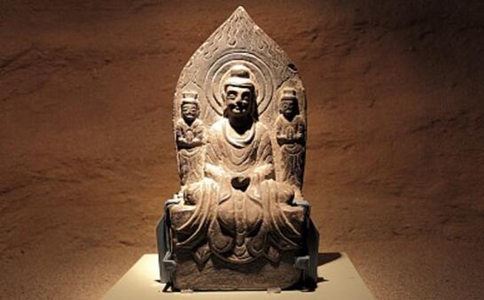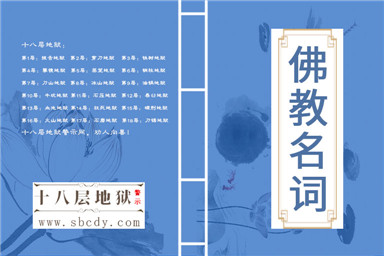-
Master Da'an: What is the root of death?
The following is a very unique insight of Master Zhiyi, which is to interpret this scripture from the perspective of us ordinary beings. I read this passage "To Understand", which is very important. Again, the Buddha used great vows as the cause of many good roots for all sentient beings, and made great deeds for the many blessings of all sentient beings
Master Da'anTime: 2025-08-06
-
The Buddhist Classic of Filial Piety - "Bon Sutra"
The Buddhist scripture of filial piety, the "Bon Sutra", is taught at the Obon puja today, the 15th day of the seventh lunar month. July 15 is a major holiday in Buddhism, called "Buddha's Day of Joy". Why is the Buddha happy? According to the sangha system set up, monks
The Buddha explained the Obon SutraTime: 2025-08-04
-
What karma did a person with a big temper, suspicion, and jealousy create in his previous life?
If he is jealous, he will have heavy lust in his previous life; If he has a big temper, he will kill in his previous life; If he is selfish, he is good at stealing things in his previous life, he is too selfish, he only knows selfishness. We humans are like a speck of dust in the void. This grain
comeuppanceTime: 2025-08-01
-
Learn a little bit of Buddhist knowledge every day; 100 questions for laypeople to learn Buddhism?
We can't believe that Amitabha Buddha has painstakingly designed a blissful world for us, waiting for us over there, waiting for us every day, stretching out his hands, preparing
Buddha statue knowledgeTime: 2025-07-31
-
The three classics of Buddhism to protect the country
I hope that the public can pay attention to these three very special Mahayana scriptures, and at the same time, I hope to have a deep understanding of Mahayana Buddhism's idea of protecting the country, and a deeper understanding of the practical care and practice of the spirit of the Bodhisattva path
Buddha statue knowledgeTime: 2025-07-31
-
What does "bodhisattva" mean?
【Introduction to the Classics】"Upasaka Precepts", seven volumes. Translated by Tan Wu from Beiliang. It is also known as the "Good Life Sutra" and the "Upasaka Precepts". The Buddha spoke the Mahayana Upasaka precepts (lay precepts) for good beings, and unfolded around this, explaining the six paramitas such as generosity. The content of the whole scripture
Buddha statue knowledgeTime: 2025-07-31
-
Zhao Puchu: What is "causal continuity"?
Q: What is "causal continuity"? Answer: All the dharmas born from cause and effect are certainly impermanent, but they are continuous, like flowing water, passing before and after, arising after the back, cause and effect, without interruption, this is in terms of vertical. From the horizontal
comeuppanceTime: 2025-07-30
-
What are the Five Precepts?
The five precepts are: do not kill, do not steal, do not commit adultery, do not lie, and do not drink. Although there are many Buddhist precepts, the most important is the five precepts, which must be observed from the beginning of learning Buddhism to the bodhisattva. Don't kill, the first precept of the five precepts The result of killing is illness and short life
Buddha statue knowledgeTime: 2025-07-30
-
Zhao Puchu: What is causal continuity?
Q: What is "causal continuity"? Answer: All the dharmas born from cause and effect are certainly impermanent, but they are continuous, like flowing water, passing before and after, arising after the back, cause and effect, without interruption, this is in terms of vertical. From the horizontal
comeuppanceTime: 2025-07-29
-
Buddhist knowledge that Buddhist disciples must know
The first day of Nirvana was February 15, 485 BC, which was the last day of Shakyamuni Buddha's life. On this day, the Buddha's loving face suddenly appeared with an incredible brilliance, more complete, purer, and more solemn than usual, like the sun and moon, bright and brilliant; Like the sea one
Buddha statue knowledgeTime: 2025-07-28
-
What methods can be used to prove that past lives and future lives really exist?
Nowadays, many people chant Buddha every day, and it is a good thing to be able to chant Buddha every day, but it is not enough to chant Buddha, you must know the truth of chanting Buddha, where is the greatness of Buddha? Where is the wisdom excellence of the Buddha? Take the most common four words of universal sentient beings, those who truly learn Buddhism
Buddha statue knowledgeTime: 2025-07-28
-
Master Xuanhua: Those who practice Buddhism do not move their minds no matter what state they are in
Those who study Buddhism must know and practice Buddhism, that is, eat Buddhism, wear Buddhism, and sleep Buddhism. Walking, sitting, and lying down are all in the Dharma. Those who know the Dharma are all premised on benefiting others, and never plan for their own benefit. All in all, it is necessary
Master XuanhuaTime: 2025-07-27
-
What is the difference between a temple and a temple?
What is the difference between a temple and a temple? In various news reports about Buddhism, you can often see reporters and friends calling Buddhist monasteries temples, and sometimes chatting with some laymen, you can often hear them say: I went to the temple to burn incense one day. that
Buddha statue knowledgeTime: 2025-07-26
-
The meaning of "dedication" in Buddhist common sense
Dedication (Sanskrit parinama), also known as dedication, turning, and giving. It means to turn the merit and good roots you have done to benefit Bodhi, or to be reborn in the Pure Land, or to give to all sentient beings. As the old translation of the "Huayan Sutra" Volume 15 "Ten Directions" said: This Bodhisattva Mahāsattva practices
Buddha statue knowledgeTime: 2025-07-26
-
Buddhist knowledge eight levels of fasting
The Eight Precepts of Fasting are the precepts and fasting methods formulated by the Buddha for temporary monastic practice for lay disciples. Because the lay family is busy with worldly affairs and has no time to practice. The Buddha had compassion and planted good causes for the world in order to let them live a pure life of monks for a day and a night; It can also adapt to being at home
Buddha statue knowledgeTime: 2025-07-25
-
What is ignorance?
What is ignorance? Ignorance: Ignorance is affliction, and it is also one of the other names for afflictions. Focusing on the cause is called ignorance, and focusing on the effect is called affliction. There are two kinds of great divisions, namely one-thought ignorance and beginningless ignorance. A thought of ignorance is also called an affliction, and it is called a hindrance to seeing thoughts. There is no beginning and no light, and it is called
Buddha statue knowledgeTime: 2025-07-25
-
Dazhen Khenpo: What is the biggest problem?
Dazhen Khenpo: What is the biggest problem? When I was sick that year, I didn't miss this life at all, I didn't have anything I couldn't let go, but I wasn't very sure about the bardo and the next life, although I knew the whole process. At that time, I was only one around
Buddhist Questions and AnswersTime: 2025-07-25
-
How to correctly call a Buddhist monk? These words are not safe
Buddhist Knowledge | How to correctly call a Buddhist monk? It is safest to use this word, and a senior brother mentioned that which ones are not suitable for lay monks to call monks! It is inevitable to lose the courtesy of a disciple and lose one's own blessings, so I will share another article here! The following two
Buddha statue cultureTime: 2025-07-24
-
What is the difference between seeking to live in the Pure Land at the end of life and seeking to ascend to heaven after death
Is there a difference between seeking to survive in the Pure Land and seeking to ascend to heaven? The answer is yes. My teacher Yin Hairen once said that his teacher Yin Shun had a good summary of this. Yin Lao summed up three points: the Pure Land of Survival is an ascent rather than a fall, and it is equality rather than a step
Buddha statue cultureTime: 2025-07-24
-
Master Xuanhua: What do the ten names of the Buddha mean?
"Tathagata" is one of the ten numbers of the Buddha. A layman asked me, "Is there a difference between the Tathagata Buddha and Amitabha?" In fact, Amitabha Tathagata, Shakyamuni Tathagata, and Medicine Buddha Tathagata, each of these Buddhas is called "Tathagata". It's not that this Buddha alone is called Tathagata,
Master XuanhuaTime: 2025-07-24
-
What is determination?
What is concentration in Buddhism? It's not that we close our eyes, we can't see anything, we can't hear anything, and we don't have any thoughts. This is only a preliminary stage, not a real determination. What does it mean? It must be not to be external
The Buddha prepared the ritual vesselsTime: 2025-07-22
-
Declaration of the establishment of the Buddhist Layman Forest in Jinsha District, Nantong
Cause and effect are the great powers of the sages of the world to govern the world and liberate all living beings. Confucian sages pay attention to cause and effect, and it is difficult to count them in the classics. When Confucius praised the "I Ching," he began by saying that a family that accumulates good deeds will surely have residual blessings; a family that accumulates bad deeds will inevitably have residual calamities. You must know that there is already a blessing
Pure Land TreatiseTime: 2025-07-22
-
What are the methods of liberation in Buddhism?
The principle of liberation is emptiness, and the purpose of liberation is selflessness. Because theory is one thing, empirical evidence is another, just like a history,
Buddha statue cultureTime: 2025-07-22
-
Master Kuanjian replied: My husband doesn't care about anything, he lives with others outside, what should I do?
Disciple: My child's father doesn't care about anything, he lives with others outside, and I take care of the child and the old lady alone, what do you think I should do? To go or not to go? Master Kuanjian: After learning Buddhism, you must learn how to treat it, how to choose? Go, or not
Han biography figuresTime: 2025-07-21
-
Master Kuanjian answered: What Buddha should people with deep karma recite?
Question: What Buddha should people with deep karma recite? Master Kuanjian: No matter what sutra or Buddha you recite, it is all harmonious and unhindered, it is not one, not two. Ordinary people are always led by the nose, day and night, if they really treat one Buddha and one Bodhisattva
Han biography figuresTime: 2025-07-21
-
What is Blessing?
The addition is when the Buddhas and Bodhisattvas give us their kind wishes, or the merits and blessings they have achieved, this is called adding. The so-called holding is like taking it with our hands, holding it up, and holding it. Buddhas and Bodhisattvas use their compassion, wisdom, and merit to give us all kinds of blessings and help
Buddha statue cultureTime: 2025-07-21
-
What exactly do you learn to learn Buddhism?
Enlightenment is achieved through the practice of chanting Buddha and meditation. How to be enlightened? In modern philosophical terms, how to understand the world, this is the epistemology of Buddhism. Buddhist epistemology includes dependent arising and causality, leaving dependent arising and causality.
Buddha statue cultureTime: 2025-07-18
-
What does Buddhism's "six harmony respect" mean?
When the Buddha lived in the world, he led seven disciples, including bhikshus, bhikshunis, novices, novices, novice nuns, Shikshamanas, Upasakas, and Upasakas, and there were as many as 1,250 people in terms of the Buddha's constant followers. How did the Buddha govern such a huge sangha?
Buddha statue cultureTime: 2025-07-18
-
Heart Master: What is the special meaning of wearing Buddha beads?
What is the special meaning of wearing Buddha beads? I talked about the topic of "who can bring Buddha beads" in the previous blog, and many people pay attention to it, so today we will continue to talk about what special meaning it means to bring Buddha beads. Perhaps, some friends think that anyone can wear it now
Han biography figuresTime: 2025-07-17
-
Master Mind: Who is destined to be with the Buddha?
Who is destined to be with the Buddha? Li Ming has been very smooth since he was a child, and his grades were excellent when he was in school, and further education and employment were not a problem for him at all; I got married soon after working, and my wife is a classmate who has been in love for many years, and everyone envies them as golden boys and girls. Work a few times
Han biography figuresTime: 2025-07-17
-
What does the "six roots" in the "six roots of purity" often refer to in Buddhism?
Buddhism looks at life in the universe and is neither materialist, nor idealist, nor deist, but a dependent theist who advocates the harmony of cause and effect. Therefore, Buddhism looks at the composition of a person from three aspects: psychological, physical, and physical. topmost
Buddha statue cultureTime: 2025-07-17
-
Minghua Layman: Does Buddhism say that everything is predestined?
Many Buddhist practitioners are influenced by fortune-telling, etc., and fortune tellers can roughly calculate some situations in our lives today, so they superstitiously think that Buddhism says that everything is predestined, and some people even think that if everything is predestined, then why should we learn Buddhism?
comeuppanceTime: 2025-07-17
-
The concept of time in Buddhism
1. Kāla and samaya In Sanskrit, there are many terms used to express time, and there are two that are often mentioned in Buddhist scriptures: one is kāla (gara), and the other is samaya (samaya). Early Indian religion or philosophy to make
The Buddha prepared the ritual vesselsTime: 2025-07-16
-
What is Nirvana?
Nirvana refers to the elimination of life and death, the elimination of afflictions and the state of liberation from non-action, that is, neither birth nor death. Nirvana is translated as complete death, the perfection of merit is called roundness, and the extinction of karma is called silence. Nirvana is the highest state that Buddhist practice aims to achieve. Why Nirvana Buddhism believes
The Buddha prepared the ritual vesselsTime: 2025-07-16
-
Introduction to Korean Buddhist Holy Places (2) - Korean Buddhism Jogye Sect Naksan Temple
The statue of Guanyin Bodhisattva in the sea looks down at the vast East China Sea and shows a relieved smile at Luoshan Temple in Xiangyang. Since the establishment of the temple by Master Uixiang in the Silla era for more than 1,300 years, it has been a popular place for Guanyin prayers. After the spread of the word that Guanyin Bodhisattva settled here,
The Buddha prepared the ritual vesselsTime: 2025-07-15
-
What is the secret of great wealth and great fortune?
When we come to this world, whether it is in the past life, the present tense, or the future life, people need blessings to nourish their physical bodies and satisfy their desires. There are many ways to obtain great blessings, and some people say that it depends on hard work
comeuppanceTime: 2025-07-15
-
Master Hengchuan: I always dream at night and sleep poorly, what is the reason for this?
Question from the good man: Master, my husband always lies flat, sleeps with his hands on his pillow, sleeps always by nightmares, for several years, and I myself never dare to sleep flat, I am nightmare when I lie flat, I always dream at night, I don't sleep well, what is the reason for this?
comeuppanceTime: 2025-07-15
-
Appreciation of Buddhist stone carvings in Qingzhou Longxing Temple
From the Western Han Dynasty to the early Ming Dynasty, Qingzhou has been the political, economic and cultural center of the Shandong Peninsula. Buddhist temples began to be built very early, and Ningfu Temple was built in the second year of Tai'an in the Western Jin Dynasty (303 AD). Longxing Temple began to be built during the Liu and Song dynasties, and during the Song and Yuanjia periods, it was called the Buddhist Hall.
Buddha statue cultureTime: 2025-07-14
-
Master Yuan Yin answered: What is release?
Q: What is release? Master Yuan Yin answered: Releasing living beings is an act of seeing living alien beings, being captured, arrested, imprisoned, and killed, panicked, and dying, showing compassion, buying things to redeem, and rescuing and releasing them!
Release Q&ATime: 2025-07-12
-
Hangzhou Lingyin Temple Supervisor Temple talks about Buddhist vegetarianism: contributing to a harmonious society
Hangzhou Lingyin Temple Supervisor Temple talks about Buddhist vegetarianism: contributing to a harmonious society China-Singapore Zhejiang Net, August 20 (Reporter Wang Enmin, intern Xi Wei) "Vegetarianism can bring us physical and mental peace and joy. At the same time, the taste enjoyment brought by vegetarianism is also full of nature
Eat vegetarian earlyTime: 2025-07-12
-
What is the difference between Buddhist intellectuals and cultivated masters?
A senior brother asked: What is the difference between a Buddhist intellectual and a cultivated master? Buddhist intellectuals are [knowledge points], and corresponding to them are [non-intellectuals]. A monk with cultivation is a [monk], and the corresponding one is a [layman]. So just that
Buddha statue cultureTime: 2025-07-11
-
Is wearing Buddha beads superstition? What are the benefits of wearing it for people who do not believe in Buddhism?
went to Wenchang to watch the satellite go to the sky, and Dai Huiwen Buddha beads returned home safely. Hainan Huiwen Government, Huiwen Buddha Bead Association, and Huiwen Buddha Bead Trading Market are the only designated Buddha bead cultural exchange platforms. For practitioners, rosary beads are indispensable magic tools, whether they are monks
Buddha statue cultureTime: 2025-07-11
-
Master Dayuan: What are the criteria for testing whether life is awakened?
The criterion for testing whether or not one has woken up is actually a sentence that Wisdom Bodhisattva asked Manjushri Bodhisattva in the "Pure Conduct of the Avatamsaka Sutra": For a person whose life has awakened, he can achieve no fault of losing his body, language, intention, and karma. The seven words of no fault loss of body and meaning are very good
Han biography figuresTime: 2025-07-09
-
Master Dayuan: What is the most important homework we need to do now?
There was a female layman who was still very distressed after learning Buddhism. Once, he said: I originally had troubles before, so I hope that learning Buddhism can eliminate them. But it seems that after I learned Buddhism, I felt more troubles. Because I feel that after learning Buddhism, I feel like a son
Han biography figuresTime: 2025-07-08
-
Buddha Ge tells the story of Buddhist knowledge
There are often friends who are troubled by emotional marriage, and there are often people who ask about helpless marriage and marriage and happy amulets, hoping to pin their hopes on the help of amulets, and there are not a few more extreme people who want to help with the evil laws of the underworld. In fact, even if it is a really helpful amulet
Buddha statue cultureTime: 2025-07-08
-
Buddhist knowledge | What is a bodhisattva?
Bodhisattva is the abbreviation of Sanskrit transliteration Bodhisattva. Its Chinese translation of Bodhi is enlightenment, and the Chinese translation of Sattṣṇa is sentient beings, or sentient beings (all animals with feelings), and the full translation should be: enlightened sentient beings, Taoist sentient beings, and enlightened sentient beings. According to the meaning of this word, ancient Chinese translation
Buddha statue cultureTime: 2025-07-07
-
Master Da'an: After converting to Buddhism, is it okay to worship in Taoism?
Q: Is it okay to worship Taoism after converting to Buddhism? Master Da'an answered: Converting to Buddhism means determining the spiritual destination and life value goals. When I received the three refuges, I solemnly promised: since I took refuge in Buddha, I will no longer take refuge in the heavenly demons and heretics; Self-conversion to the law
Master Da'anTime: 2025-07-05
-
Learn a little bit of Buddhism every day? How much do you know about the etiquette of the fasting hall?
The internal and external dignity should be sufficient [Hengshan Temple] How much do you know about the etiquette of the fasting hall? 1. Internal: Five views of food and storage (1) Calculate the amount of merit and where it comes from (2) Think about one's own virtue and lack of supply (3) Prevent the mind from being greedy and so on (4) Doing good things and good medicine to cure the body and dryness (5) Achieving enlightenment
Buddha statue cultureTime: 2025-07-04
-
What is Mahayana and Hinayana in Buddhism?
The Buddha told the audience with shallow roots the fundamental principles of being a human being, keeping the five precepts, and practicing the ten good deeds, which is called the human heavenly vehicle; For those who have a strong sense of world-weariness, they talk about the way to liberate from life and death, which is called the Hinayana of sound and hearing; For listeners with deep roots and sad wishes to transform into the world, it is
Buddha statue cultureTime: 2025-07-04
-
Master Yanci: Don't misunderstand the meaning of "following fate"
The word "follow-up" is the mantra of many people. Especially when you encounter difficulties, can't do something well, don't want to take care of it or can't control it, blurt out: Let it be! In fact, it is not easy to do it with fate, and only those with true wisdom can do it. so-called
Han biography figuresTime: 2025-07-02




